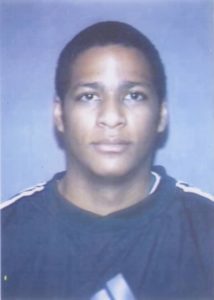For the last sixteen years, Jeremy Puckett has been seeking justice.
In March, 1998, Anthony Galati’s body was found on the side of a road in Sacramento County. Galati suffered two gunshots to the head, his hands were tied behind his back and he had no wallet, keys, money, or identification. Galati’s car was found a few days later; it had been torched. The case soon went cold.

NCIP client Jeremy Puckett
Three-and-a-half years later, in September of 2001, Jeremy Puckett was arrested and charged with Galati’s murder.
Two years prior to Puckett’s arrest, an inmate named Israel Sept, approached a prison guard saying he had information about Galati’s murder and wanted to negotiate benefits for himself and his family in exchange for information about the case.
Sept admitted to being at the murder scene. He met with government investigators three times; offering three different statements implicating Puckett in the murder. Sept’s three statements to government investigators were riddled with inconsistencies; the gist of his story was that Puckett forced him to participate in Galati’s murder-robbery. Sept claimed he was coming forward because of his new-found religious beliefs.
Prosecutors first charged only Sept with the murder and robbery of Galati. After opening statements at Sept’s trial, he pleaded guilty to the robbery of Galati and accessory to his murder in exchange for a lenient sentence (11 years and eight months rather than a life sentence) and a promise to testify against Puckett. Based on Sept’s statements, police arrested Puckett and charged him with Galati’s murder.
There was no physical evidence implicating Puckett in the crime. His fingerprints did not match items abandoned at the scene. No DNA testing was done. The case against Puckett depended primarily on Sept’s claim that Puckett forced Galati, Sept and a woman out of an apartment and to the murder sight where Galati was shot.
Prior to Puckett’s trial, Sept recanted his original story. He told Puckett’s defense counsel and the public defender’s investigator that he and two others, not Puckett, had set up Galati to be robbed at the apartment complex. However, Sept contradicted his recantation at trial, again pointing the finger at Puckett. Puckett’s trial attorney did not enter the recantation into evidence so the jury never knew that Sept had changed his story and implicated others.
The only other evidence against Puckett was provided by two people who were at apartment the night of the murder. One said that the person leaving with Galati was the same height as Puckett and the other claimed, for the first time at trial, that she heard Puckett’s voice when she was in the bathroom ingesting alcohol and drugs.
On February 8, 2002, a jury convicted Puckett of murder and robbery; the jury acquitted him of a possession of a firearm charge. He was sentenced to life without the possibility of parole.
Puckett first contacted NCIP in 2012 asking for assistance with his case. NCIP uncovered 700 pages of suppressed materials, many of which corroborated Sept’s recantation and implicated others in the murder-robbery. NCIP’s re-investigation also uncovered overwhelming evidence of Puckett’s innocence including a confession by an alternate perpetrator, a gun associated with the alternate perpetrator, impeachment evidence and an alibi that was not presented to the jury. Cumulatively, the suppressed and newly discovered evidence demonstrates Puckett’s wrongful conviction.
In July of 2016, NCIP and pro bono partner Simpson Thacher & Bartlett LLP, filed a petition for writ of habeas corpus on Puckett’s behalf in the Sacramento County Superior Court. The court denied Puckett’s petition without a hearing. A subsequent habeas petition filed in the Third District Court of Appeal was denied without explanation. In August of 2017, NCIP and Simpson filed a petition for writ of habeas corpus in the California Supreme Court which remains pending. The Court has ordered informal briefing in the case.
NCIP continues its efforts to seek justice for Jeremy Puckett. We will keep you updated on any advancements in the case.
